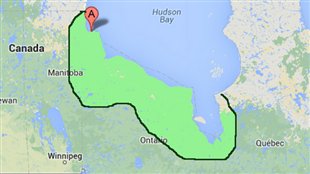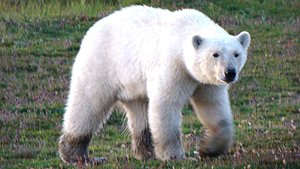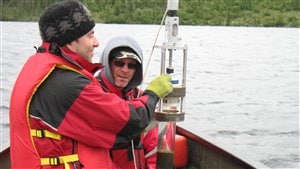It’s one of the last unchanged Arctic refugia in the world. Or, it was.
The vast area around Hudson Bay, had been a holdout against climate change until a little over a decade ago.
John Smol has been studying arctic climate issues for 30 years. He is a professor of Biology at Queen’s University, in Kingston, Ontario He also holds the Canada Research Chair in Environmental Change
ListenProfessor Smol is co-author of the Queen’s University led research on the status of the region with the report published this week in the Proceedings of the Royal Society B (Biology).

The report says while this southernmost Arctic refugia has remained unchanged for millenia, the area has entered ” a new ecological state” and is clearly linked to climate change.
The team from the Paleoecological Environmental Assessment and Research Laboratory (PEARL) at Queen’s, studied algae fossilized in four lakes in the region which provided a historical record of past ecosystems
The Hudson Bay lowland covers a vast area of wetland, peat bog and fens in northern Ontario and extending east into the province of Quebec, and west into Manitoba, an area of well over 300,000 sq,km Some 85% of the region is wetland with fully 50%
In the short summers, the area is filled with ponds, lakes, marshes and slow moving rivers eventually draining into the salt water of Hudson Bay. Because that enormous body of water is ice-covered for much of the year, it has acted like a refrigerator keeping the region cooler with a year-round temperature mean average of -4C.

However, while the ice surface of the Bay has provided stability and maintenance of this subarctic ecosystem in the past from the global warming affecting the greater Arctic, scientists have begun noticing that this too is now changing.
Substantial changes have been noted in such things as shorter winters with shorter periods of ice cover, and much warmer temperatures causing more evaporation and lower levels of water, and negative effects on marine life and land flora and fauna.

As professor Smol points out, the region has been a carbon sink, mitigating some of the effects of greenhouse gases, but as the climate warms, the enormous peat bogs, mosses and shrubery cease to absorb CO2, and instead dry and release their trapped gases thereby adding to warming and adding to a feedback loop.
Lead author of the study, Kathleen Ruhland says “Our findings indicate that ecological tipping points have been crossed and, sadly, we are witnessing the loss of Arctic ecosystems as we know them”.
The Queen’s University research team report says the area has “passed a tipping point, the pace and magnitude of which is exceptional even by Arctic standards,”

Also on the team were, Andrew Paterson, a research scientist at the Ontario Ministry of the Environment and an adjunct professor at Queen’s, Bill Keller, Director of Climate Change and Multiple Stressor Aquatic Research at the Cooperative Freshwater Ecology Unit at Laurentian University, and Neal Michelutti, a research scientist from Queen’s University’s PEARL.
Professor Smol points out that as we continue to talk and debate about warming and what to do, the situation is getting worse. He says concerns about the economy, about terrorism, “are nothing compared to the problems we’ll have to face with climate change, and they’re not going to be easily fixable the longer we wait.”
The research was supported by the Natural Sciences and Engineering Research Council of Canada (J.P. Smol), and the Ontario Ministry of the Environment through the Climate Change and Multiple Stressor Research Program at Laurentian University (W. Keller).







For reasons beyond our control, and for an undetermined period of time, our comment section is now closed. However, our social networks remain open to your contributions.